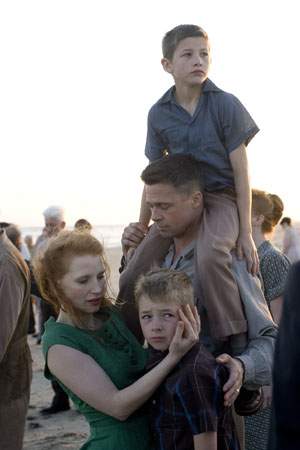
Given the film's title and its director you know it is going to be a movie with a degree of mysticism, along the lines of Darren Aronofsky's much maligned and misunderstood THE FOUNTAIN, and for many members of the cinema-going public it will be confusing and inaccessible (aka boring) in much the same way Kubrick's 2001 was (and still is). In fact, the parallels with Kubrick's sci-fi masterpiece and Malick's Palme D'Or winning epic are not very hard to find, with both directors being almost obsessively private individuals whose output was sporadic and usually on their own terms, and marked by striking visuals and cinematography. 2001 and THE TREE OF LIFE are also, paradoxically, both very hard and very simple to explain. It could be said that they are about "Life, the Universe and everything" and Malick's vision of creation and evolution is almost a religious experience for the senses. In fact, more than anything, the whole film is something that has to be experienced at a sensory rather than intellectual level.
How much UK audiences will be able to relate to the perceive idylls and harsher realities of small-town life in 1950s Texas, is yet to be seen, but the cast portray the family so well there is a naturalness to their actions that makes it almost feel like a home movie but shot on 35mm (and 65mm) film by one of the great contemporary cinematographers, Emmanuel Lubezki, who did the amazing work on CHILDREN OF MEN. Thankfully there is something universal about childhood that overcomes the nostalgia, and reveals the mystery of what children did in a time before video games and computers.
There really isn't much more to say about this film without it sounding like intellectual tosh, which is contrary to what the film is about - a celebration of life that has to be experienced for the pure cinema that it is.